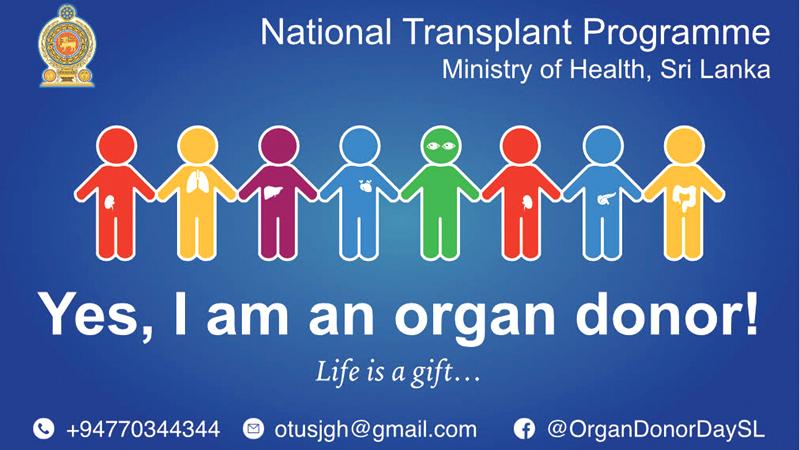
World Kidney Day was observed on March 11 across the world. The recent upsurge of kidney infections especially, Chronic Kidney Diseases (CKD) in the North and North East in Sri Lanka has raised concerns among nephrologists currently battling to reduce fresh cases of kidney diseases in other districts including the over populated Western province.
The Sunday Observer spoke to Consultant Nephrologist, Sri Jayewardenepura General Hospital, Dr Chinthana Galahitiyawa, to find out what causes kidney disease a subject still to be properly understood by the public, and the options available to those dependent on dialysis to survive, to help them gain a fresh lease of life.
Following are excerpts…
 Q. Kidney disease has come into focus recently with an upsurge of kidney patients being reported island wide . Although it is one of the leading non communicable diseases ( NCD) in the country, many people still don’t know what exactly Kidney disease is, or for that matter how and where it originates. Can you explain to our readers what role the kidneys play in helping us maintain a healthy life?
Q. Kidney disease has come into focus recently with an upsurge of kidney patients being reported island wide . Although it is one of the leading non communicable diseases ( NCD) in the country, many people still don’t know what exactly Kidney disease is, or for that matter how and where it originates. Can you explain to our readers what role the kidneys play in helping us maintain a healthy life?
A. Kidneys are the main filter of the body. All the toxins that enter the body with food and beverages and produced inside the body in its complex metabolic processors are cleared by the kidneys. Kidneys play a major role in balancing the body water content, acid-base status and salt and electrolyte content. They contribute to the production of a hormone called erythropoetin which gives the signal to produce red cells (hemoglobin) and vitamin D. Kidneys are responsible for maintaining the blood pressure of the body as well.
Q. Are there different kinds of kidney diseases? If so what are the most common?
A. There are three main types of kidney diseases. The first type is due to the lack of blood supply to the organs such as in shock and in severe dehydration. The second type is due to the diseases of the kidney tissues itself ex- diabetes related and nephrites. The third category is by blockage of the drainage system ex- prostate enlargement.
Q. Which of these are most prevalent?
A. The commonest causes worldwide is diabetes and high blood pressure related kidney failures. Poorly controlled blood sugar levels and blood pressures are the main factors that trigger the rapid irreversible deterioration of kidney functions. The commonest type in Sri Lanka as well as anywhere in the world is type two.
Q. Can kidney disease be inherited?
A. There are many hereditary kidney diseases, e.g. Polycystic kidney disease, Alport’s syndrome. But more importantly, diabetes also has genetic predisposition.
Q. Today being World Kidney Day Steering Committee has declared 2021 the year of ‘Living Well with Kidney Disease’. What is the significance of this theme to Sri Lankans?
A.’ Living Well with kidney disease’ is a timely theme as these patients need lot more attention, education and treatments to maintain their health status, to prevent them reaching end stage kidney failure and improve their quality of life. The main focus is to identify CKD patients and educate them regarding the available treatment and therapeutic options to improve their quality of life and life span. Untreated patients will rapidly deteriorate to reach end stage where they need dialysis or kidney transplant.
Q. What are the early symptoms of the disease? Are they visible at the onset?
A. The danger of CKD is that it does not have early symptoms. Usually patients will start developing symptoms once their kidneys have damaged more than 70 percent. But certain kidney diseases can be detected early by investigations. The best example is mild protein leak in diabetics. This is why all high risk persons for CKD should be screened periodically to detect at an early stage.
Q. Is anaemia a sign of kidney disease?
A. Yes. As we discussed at the beginning the red cell production of the body will be reduced in CKD. This usually happens when the kidney functions have dropped below CKD stage 3 due to the deficiency of the hormone called erythropoetin.
Q. Are there different stages in the progress of kidney disease? If so what are they?
A. CKD is classified according to the rate of kidney functions. Scientifically it is called ‘estimated glomerular filtration rate (eGFR)’. Normal eGFR is more than 90. When the disease progresses this figure drops and becomes less than 15, which is called the end stage kidney failure (CKD stage V). CKD stage V patients need assistance to carry out the functions of the kidneys by some other way such as dialysis or kidney transplant.
Q. As it advances what are the symptoms to look out for?
A. Symptoms of advanced CKD are loss of appetite, nausea, vomiting, lack of sleep, itching of the body, swelling and confusion. They may pass less urine and have difficulty in breathing.
Q. Can CKD be cured??
A. CKD is not curable. Early detection of CKD will help to protect the kidneys from further deterioration and prevent reaching end stages. But there are many kidney diseases that are curable if detected early, e.g. nephritis, kidney infections, blockage to drainage system.
Q. How is kidney disease diagnosed? What are the tests required, who does them and where?
A. This depends on the type of kidney disease suspected according to the patient’s history and examination. Basically, urine analysis, blood biochemistry, plain X-Ray of kidneys and ultrasound of kidneys will detect the majority and guide further planning.
Q. Symptoms - Does a new patient with early symptoms require to be hospitalised? Or can he return home and continue his normal life?
A. No. Most of the early patients can be educated and treated on outpatient basis and periodically reviewed at clinic levels.
Q. How do you monitor the control of disease?
A. Basically, a blood test called ‘serum creatinine’ is the main indicator of kidney function. Depending on the severity patients will need to perform this test at regular intervals before they see the doctors.
Q. Treatment: How do you treat a patient who has just been diagnosed with kidney disease?
A. Treatment is based on the cause and the degree of kidney damage. Both of these should go parallel with each. The best example is the diabetic kidney disease where the main focus is on blood sugar control. Diabetes and high blood pressure patients are at the highest risk of getting CKD and they account for two-thirds of the CKD population.
Q. Is the treatment tailor-made to suit the patient’s current health status?
A. Yes. Each patient is unique. The treatment, water intake and the diet will differ accordingly.
Q. Can healthy lifestyles prevent kidney disease?
A. Yes. Healthy lifestyles, proper hydration, maintaining ideal body weight and cessation of smoking can prevent or retard the progression of CKD.
Q. Exercise? Is obesity a contributory cause for early development of chronic kidney problems?
A. Yes, obesity can cause CKD in many ways. Obese patients are more prone to diabetes and high blood pressure which are the main causes of CKD. Further, in obese people, both blood sugar and blood pressure controls are poor. Obese individuals develop CKD by mechanisms independent of diabetes and high blood pressure.
Q. At present we are in the midst of a Covid-19 pandemic with a new variant circulating in four districts. To what degree are kidney patients at a higher risk than the normal population if exposed to the new variant that is also mutating?
A. CKD patients are at higher risk of catching Covid-19 infection and their outcomes are worse, especially, kidney transplanted patients carry the highest risk and their mortality is the highest.
Q. What are the options available for kidney patients in Sri Lanka today?
A. A comprehensive care package is available in the state sector for all CKD patients. This includes specialist clinics, a complete array of investigations, medical treatment, dialysis and kidney transplant.
Q. Will replacing a kidney with a new kidney give the patient a new lease of life?
A. Of course. A single functioning kidney is adequate for any individual to run a normal life. After a kidney transplant, patients will regain their normal health status and can get back to their normal life to carry out all basic functions, occupation and even to have family life and children.
Q. I understand that this procedure is available at the Sri Jayewardenepura Teaching Hospital where you currently work? How successful has it been so far?
A. Yes. We have a successful kidney transplant program in Sri Lanka. Our patient and graft survival rates are comparable to all developed countries.
Q. As there is still a severe shortage of kidneys even using both methods, how do you recommend overcoming this obstacle?
A. We are working on a national organ donation program. With this aim, we at the Sri Jayewardenepura General Hospital established the Organ Donation and Transplant Foundation (ODTF). It is a pilot project to develop a national data base for healthy individuals who volunteer to register to donate their organs upon their death. At the same time a data base of patients with organ failure will be maintained.
In the event of a brain death of a registered donor, with the agreement of the family, the medical staff will remove the necessary organs and tissues to transplant them in patients ready in the waiting list. Once this national organ retrieval and allocation system is established, most of the people in long term dialysis will get cured. This will be based in state sector hospitals free.
The donor will save up to eight sick patients and there will be no disfigurement to the donors’ body and no undue delays for the funeral proceedings.
Q. How are the kidneys obtained?
A. They can be retrieved either from a living person or from a brain dead person with the consent from the family. Organ donation can be done in both these situations. In Sri Lanka live donation can be done to a family member or a close relative. But finding healthy donors from the family is difficult due to unavailability and the familial nature of kidney diseases.
Brain dead persons who are unsalvageable can contribute by donating their organs. The decision has to come from close family members. It is better to donate organs from brain dead persons for the betterment of many lives than wasting these precious organs in the form of burials or cremation.
From one brain dead person eight lives can be saved as he can supply two kidneys, one liver, one pancreas, two lungs, one heart and bowel. In addition to these main organs they can donate nearly 50 tissues such as eyes, skin, joints, tendons and bones. I invite all healthy individuals to register with us to donate your precious organs and tissues upon your death to save many lives.
Q. Your message to the public with regard to organ donation?
A. Life is a gift. Pass it on.
